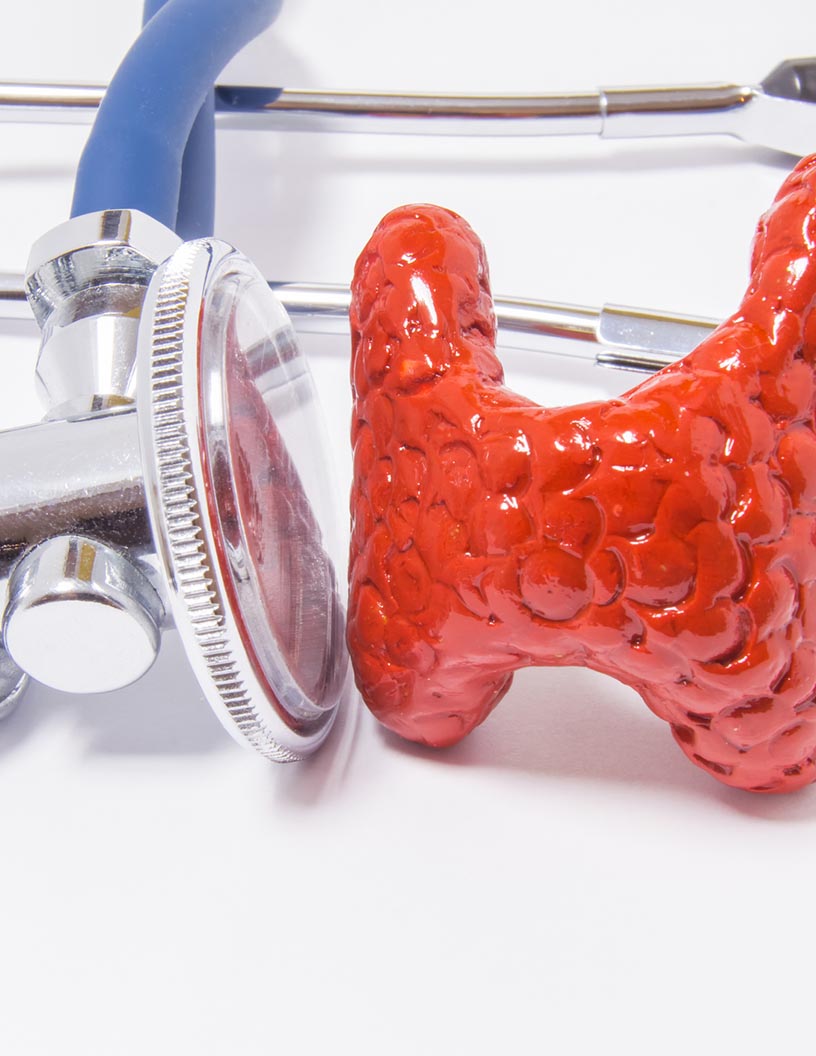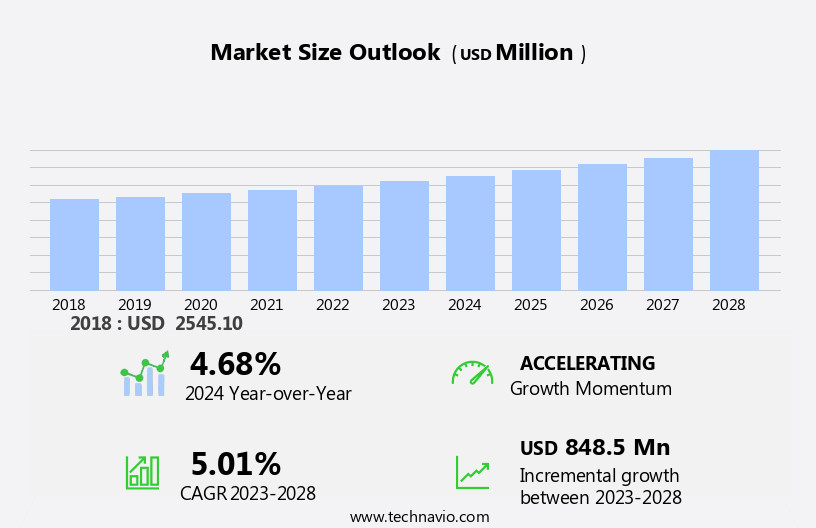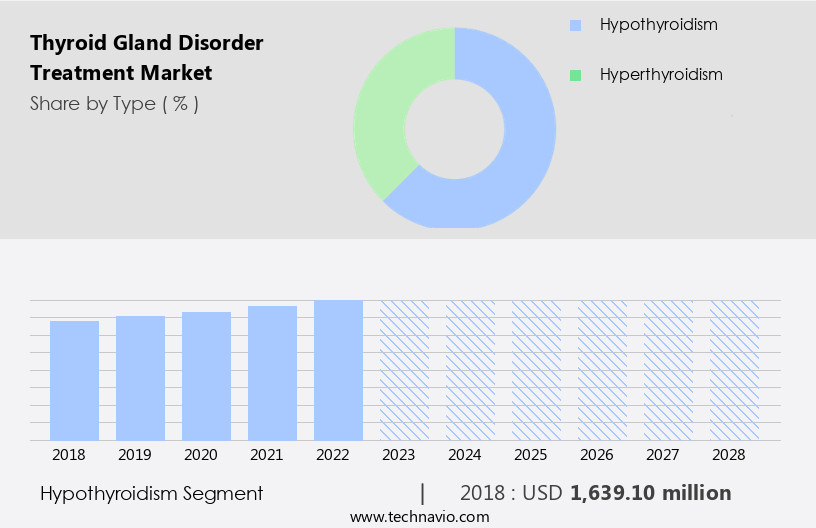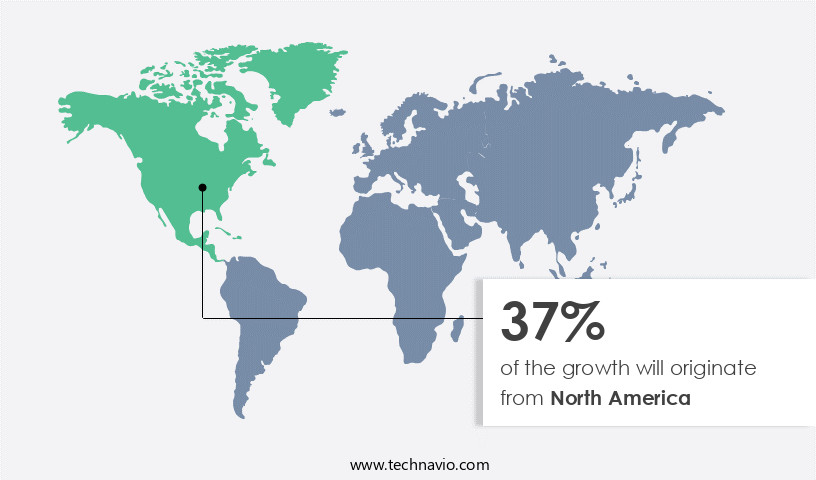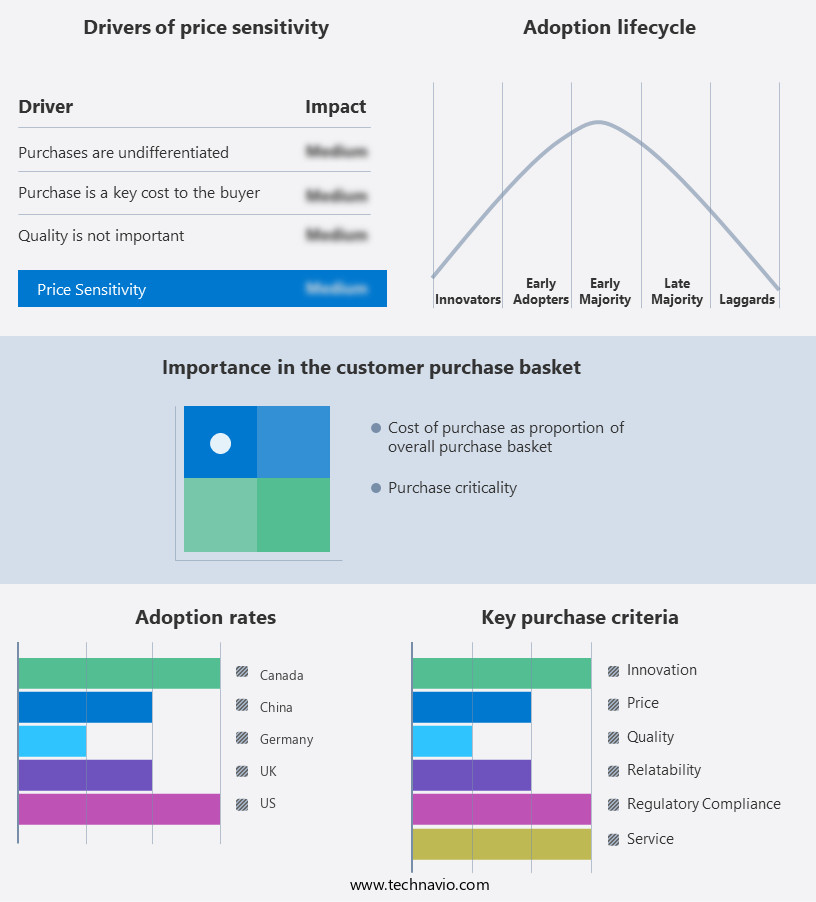Thyroid Gland Disorder Treatment Market Size 2024-2028
The thyroid gland disorder treatment market size is forecast to increase by USD 848.5 million at a CAGR of 5.01% between 2023 and 2028.
- The market is experiencing significant growth, driven by increasing awareness programs for thyroid disorders worldwide. This trend is particularly prominent in emerging economies, where the prevalence of thyroid conditions is rising due to changing lifestyles and dietary habits. However, the market's growth is not without challenges. Established players in the market hold a high entry barrier due to their extensive research and development capabilities and strong market presence. Iodine deficiency remains a significant cause of thyroid disorders, making it essential for governments and healthcare organizations to implement prevention programs. Telemedicine and remote monitoring solutions enable endocrinology consultations, expanding access to care and supporting medical tourism, while also enhancing the efficiency of medical diagnostics for patients seeking treatment across borders. As a result, new entrants must invest heavily in research and development to offer innovative solutions and differentiate themselves from competitors.
- Despite these challenges, the market presents substantial opportunities for companies seeking to capitalize on the growing demand for effective thyroid disorder treatments. Strategic collaborations, product innovation, and expanding into emerging markets are potential avenues for companies to gain a competitive edge and drive growth In the market.
What will be the Size of the Thyroid Gland Disorder Treatment Market during the forecast period?
- The market encompasses a range of conditions, including hyperthyroidism and hypothyroidism, such as Hashimoto's thyroiditis and euthyroid sick syndrome. This market is driven by various factors, including the aging global population and the increasing prevalence of thyroid disorders. Medical technology advances continue to shape the landscape, with customized medicine techniques and novel medicines emerging.
- Diagnostic technologies, including thyroid function tests and ultrasound imaging, facilitate accurate diagnosis. Market growth is further fueled by the rise in conditions like Graves' disease and iodine deficiency. Overall, the thyroid gland disorder market is experiencing significant activity and growth, with ongoing innovation in diagnostic and therapeutic approaches.
How is the Thyroid Gland Disorder Treatment Industry segmented?
The industry research report provides comprehensive data (region-wise segment analysis), with forecasts and estimates in "USD million" for the period 2024-2028, as well as historical data from 2018-2022 for the following segments.
- Type
- Hypothyroidism
- Hyperthyroidism
- Distribution Channel
- Offline
- Online
- Geography
- North America
- US
- Canada
- Europe
- Germany
- UK
- Asia
- Rest of World (ROW)
- North America
By Type Insights
The hypothyroidism segment is estimated to witness significant growth during the forecast period. Hypothyroidism occurs when the thyroid gland fails to produce adequate thyroid hormones, which can lead to health complications such as obesity, infertility, joint pain, and cardiovascular diseases. Women are more susceptible to this condition than men, and geriatric populations are also at a higher risk. Hypothyroidism often goes unnoticed during its early stages, but if left untreated, it can lead to significant health issues. Diagnostic resources, including diagnostic facilities, diagnostic labs, and diagnostic technologies, play a crucial role in identifying thyroid disorders.
Thyroid function tests, such as the Bloom Thyroid Test, are essential in diagnosing hypothyroidism. Treatment options include medication, such as Thyroxine, and customized medicine techniques. Endocrinology consultations, surgery, and radioactive iodine therapy are also viable treatment methods. Alternative therapies, such as home care testing kits and iodine supplements, are gaining popularity. Environmental conditions and certain diseases, such as Hashimoto's thyroiditis and iodine deficiency disorders, can contribute to the development of hypothyroidism. Mental duress and euthyroid sick syndrome can also impact thyroid function. The financial burden of thyroid disorder treatment can be significant, making healthcare access and affordability crucial concerns for patients.
Get a glance at the market report of share of various segments Request Free Sample
The Hypothyroidism segment was valued at USD 1.64 billion in 2018 and showed a gradual increase during the forecast period.
Regional Analysis
North America is estimated to contribute 37% to the growth of the global market during the forecast period. Technavio's analysts have elaborately explained the regional trends and drivers that shape the market during the forecast period.
For more insights on the market size of various regions, Request Free Sample
The North American market holds a significant share in the global thyroid gland disorder treatment industry, driven by the increasing prevalence of thyroid disorders and heightened awareness of timely diagnosis and treatment. According to the American Thyroid Association (ATA), approximately 12% of Americans are estimated to experience a thyroid condition at some point in their lives, with one in eight women affected. Thyroid disorders encompass conditions such as hypothyroidism, hyperthyroidism, thyroid cancer, and iodine deficiency disorders, among others. Treatment options include medication (e.g., Thyroxin, Synthroid), endocrinology consultations, diagnostic tests (e.g., thyroid function tests, ultrasound imaging, fine needle aspiration biopsy), and surgical procedures (e.g., thyroidectomy, radioiodine therapy).
Alternative therapies, such as home care testing kits and customized medicine techniques, are also gaining popularity. Diagnostic resources, including diagnostic facilities, diagnostic labs, and diagnostic technologies, play a crucial role in accurate diagnosis. Environmental conditions and mental duress can also contribute to thyroid disorders. Financial burden and healthcare access are significant challenges for patients, with healthcare organizations and retail pharmacies offering solutions through prescription drugs, medication management, and telemedicine. Novel medicines and therapy options continue to emerge, providing hope for effective treatment and improved patient outcomes.
Market Dynamics
Our researchers analyzed the data with 2023 as the base year, along with the key drivers, trends, and challenges. A holistic analysis of drivers will help companies refine their marketing strategies to gain a competitive advantage.
What are the key market drivers leading to the rise in the adoption of Thyroid Gland Disorder Treatment Industry?
- Rise in thyroid treatment awareness programs globally is the key driver of the market. Approximately 5-6% of the global population experiences subclinical thyroid disorders, with half of these cases remaining undiagnosed due to insufficient awareness. To address this issue, various organizations are spearheading campaigns to educate the public about the importance of early detection and treatment. The UN Children's Fund (UNICEF) has been instrumental in implementing the salt iodization program in Asian countries for over two decades.
- Through this initiative, UNICEF introduced Universal Salt Iodization (USI) in Southeast Asia and the Pacific regions, aiming to increase awareness and prevent complex thyroid disorders by addressing their early symptoms. Endocrinology consultations and environmental conditions are essential factors in diagnosing and managing these disorders. In addition, Euthyroid sick syndrome, a condition where the thyroid gland functions normally despite other systemic illnesses, can also contribute to misdiagnosis. The financial burden of thyroid disorder treatment can hinder timely diagnosis and access to care, making awareness and education campaigns even more important.
What are the market trends shaping the Thyroid Gland Disorder Treatment Industry?
- Rising focus on emerging economies is the upcoming market trend. The market is experiencing significant growth due to the increasing prevalence of thyroid disorders. In developed and developing regions, there is a growing preference for thyroid therapeutics. Companies are expanding their reach into emerging economies, such as the Middle East, Africa, China, and India, where the prevalence of thyroid disorders is high. For instance, in India, the prevalence of overt hypothyroidism and subclinical hypothyroidism was identified as around 2.3% and 9.5%, respectively, in February 2023. Hypothyroidism is particularly common among women aged 46-54 years.
- Given this high-potential market, numerous domestic and international companies are seeking to establish a presence in these countries. Medical technology companies are investing in research and development to innovate and improve these kits. Medications remain a primary treatment option for thyroid disorders, with various brands and generic options available. Furthermore, the market is expected to continue growing as companies expand their reach to emerging economies such as China, India, the Middle East, and Africa, where the prevalence of thyroid disorders is high and largely untapped.
What challenges does the Thyroid Gland Disorder Treatment Industry face during its growth?
- High entry barrier by established players is a key challenge affecting the industry's growth. The market is characterized by a significant presence of established players, stringent regulations, and compliance requirements for product commercialization. These factors create a high entry barrier for new companies, making the market fragmented yet dominated by prominent players. Established companies hold a substantial market share due to their advanced technological products, well-defined supply chains, and easy access to distribution channels. Smaller companies face challenges in penetrating this market due to these competitive advantages. In addition, Hashimoto's thyroiditis is a common condition that drives demand for treatment.
- However, healthcare access and organization within the healthcare system can impact the market's growth. As the population ages, the need for effective and accessible thyroid disorder treatments becomes increasingly important. In the United States, the market is subject to rigorous regulatory oversight from the Food and Drug Administration (FDA). Companies must adhere to these regulations to commercialize their products. The market's competitive landscape is shaped by a few key players, each offering advanced technologies and well-defined supply chains. To succeed in this market, new entrants must differentiate themselves through innovative products and efficient distribution networks.
Exclusive Customer Landscape
The market forecasting report includes the adoption lifecycle of the market, covering the innovator's stage to the laggard's stage. It focuses on adoption rates in different regions based on penetration. Furthermore, the market report also includes key purchase criteria and drivers of price sensitivity to help companies evaluate and develop their market growth analysis strategies.
Customer Landscape
Key Companies & Market Insights
Companies are implementing various strategies, such as strategic alliances, market forecast, partnerships, mergers and acquisitions, geographical expansion, and product/service launches, to enhance their presence in the industry.
Abbott Laboratories - The company offers different types of thyroid gland disorders treatment such as Thyronorm, Thyrocab, Thyrocal D3, and others.
The industry research and growth report includes detailed analyses of the competitive landscape of the market and information about key companies, including:
- Abbott Laboratories
- AbbVie Inc.
- Alvogen Iceland ehf
- Amgen Inc.
- Exelixis Inc.
- Fresenius SE and Co. KGaA
- GlaxoSmithKline Plc
- IBSA Institute Biochimique SA
- JEROME STEVENS PHARMACEUTICALS INC.
- Lannett Co. Inc.
- Lupin Ltd.
- Mayne Pharma Group Ltd.
- Merck KGaA
- Novartis AG
- Pfizer Inc.
- Piramal Enterprises Ltd.
- RLC Labs Inc.
- Sun Pharmaceutical Industries Ltd.
- Takeda Pharmaceutical Co. Ltd.
- Viatris Inc.
Qualitative and quantitative analysis of companies has been conducted to help clients understand the wider business environment as well as the strengths and weaknesses of key industry players. Data is qualitatively analyzed to categorize companies as pure play, category-focused, industry-focused, and diversified; it is quantitatively analyzed to categorize companies as dominant, leading, strong, tentative, and weak.
Research Analyst Overview
The market encompasses a range of conditions that affect the thyroid gland, including hypothyroidism and hyperthyroidism. These disorders can result from various causes, including iodine deficiency, autoimmune diseases such as Hashimoto's thyroiditis and Graves' disease, and environmental conditions. As populations age, the prevalence of thyroid disorders is expected to increase due to the natural decline in thyroid function that occurs with age. One trend in the thyroid disorder treatment market is the adoption of alternative therapies and customized medicine techniques. These approaches aim to provide more personalized care for patients, taking into account individual differences in thyroid function and response to treatment.
Moreover, diagnostic facilities and diagnostic labs are investing in advanced diagnostic technologies to improve accuracy and efficiency in diagnosing thyroid disorders. These technologies include ultrasound imaging, fine needle aspiration biopsy, and diagnostic technologies that enable remote monitoring of thyroid function. Thyroid function tests measure the levels of thyroid hormones in the blood, while ultrasound imaging provides visualization of the thyroid gland. The healthcare system plays a crucial role in the treatment of thyroid disorders. Healthcare organizations are working to improve access to endocrinology consultations and diagnostic resources for patients. Telemedicine and homecare testing kits are becoming increasingly popular, enabling patients to receive care and monitor their thyroid function from the comfort of their own homes. Medication management is a significant aspect of thyroid disorder treatment.
Furthermore, prescription drugs, such as thyroxin and medication for hyperthyroidism, are commonly used to manage thyroid conditions. Novel medicines and therapy options are being researched and developed to address the unique challenges of treating thyroid disorders. The financial burden of thyroid disorder treatment can be significant, particularly for those without adequate healthcare coverage. Financial resources are being dedicated to researching and developing more cost-effective treatment options, including remote monitoring solutions and homecare testing kits. The market is growing as healthcare services, including ambulatory surgical centers, increasingly offer specialized treatments and procedures for patients with thyroid conditions. Mental duress is a common comorbidity in patients with thyroid disorders. Addressing the psychological impact of thyroid disorders is an essential aspect of comprehensive care. Integrated care models that address both the physical and mental health needs of patients are becoming more prevalent in the market.
|
Market Scope |
|
|
Report Coverage |
Details |
|
Page number |
163 |
|
Base year |
2023 |
|
Historic period |
2018-2022 |
|
Forecast period |
2024-2028 |
|
Growth momentum & CAGR |
Accelerate at a CAGR of 5.01% |
|
Market growth 2024-2028 |
USD 848.5 million |
|
Market structure |
Fragmented |
|
YoY growth 2023-2024(%) |
4.68 |
|
Key countries |
US, Canada, Germany, China, UK, |
|
Competitive landscape |
Leading Companies, Market Positioning of Companies, Competitive Strategies, and Industry Risks |
What are the Key Data Covered in this Thyroid Gland Disorder Treatment Market Research and Growth Report?
- CAGR of the Thyroid Gland Disorder Treatment industry during the forecast period
- Detailed information on factors that will drive the market growth and forecasting between 2024 and 2028
- Precise estimation of the size of the market and its contribution of the industry in focus to the parent market
- Accurate predictions about upcoming growth and trends and changes in consumer behaviour
- Growth of the market across North America, Europe, Asia, Rest of World (ROW),
- Thorough analysis of the market's competitive landscape and detailed information about companies
- Comprehensive analysis of factors that will challenge the thyroid gland disorder treatment market growth of industry companies
We can help! Our analysts can customize this thyroid gland disorder treatment market research report to meet your requirements.
